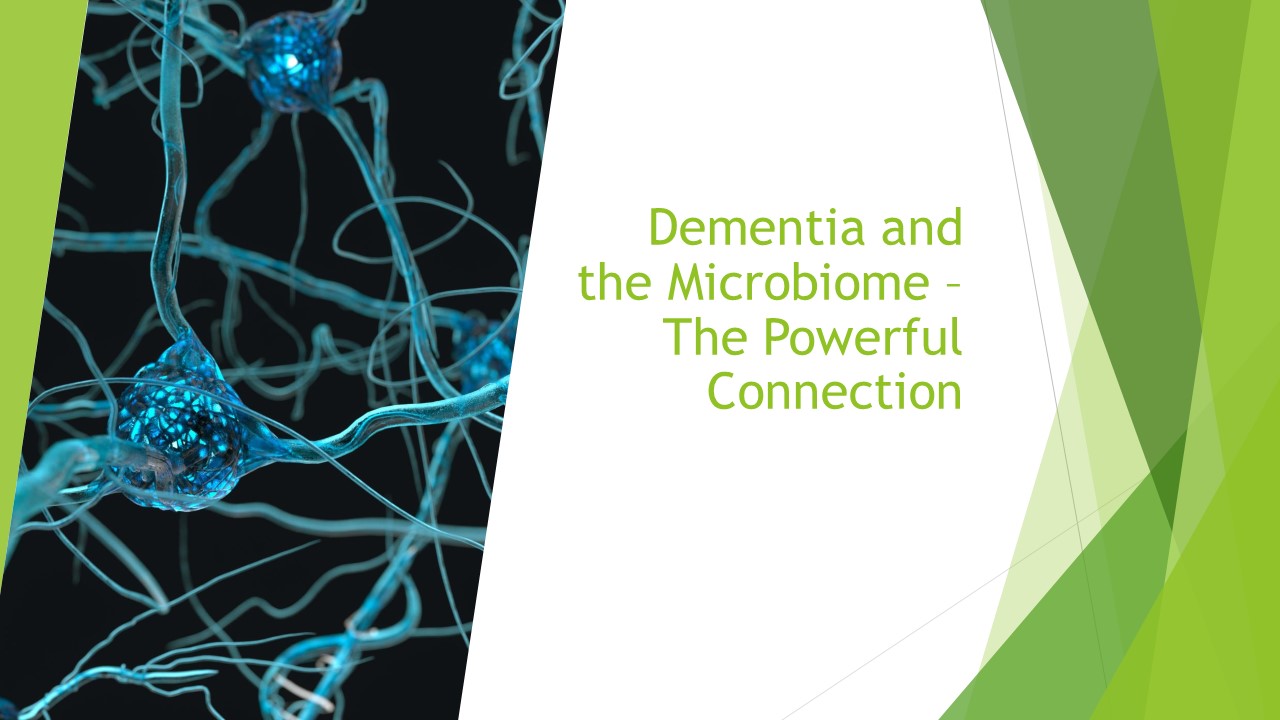I start off my presentation on dementia with two powerful case studies. They are both elderly patients with dementia, who underwent a fecal microbiota transfer (FMT) due to C-diff infections. In both cases, not only did their C-diff resolve, which is the case about 90% of the time with FMT, but their dementia symptoms reversed. This illustrates two amazing points. One, the power that the microbiome in your gut has on your overall health. And two, that dementia can be reversed. Fascinating, no?
I also go on to talk about genetic factors, and how they only amplify the connection between the microbiome and dementia. There is one bacterium I spend a lot of time discussing, E coli. The average person thinks of E coli in the context of hamburger meat recalls. But E coli is a normal member of our collective microbiomes, present in just about every single one of us.
The problem is that when the microbiome becomes dysbiotic, then E coli, and other opportunistic pathogens increase in presence, and the health-promoting bacteria are reduced. This leads to an inflammatory environment, causing changes in genetic expression of the bad guys, making them even more nefarious. With this inflammation, whole bacteria, or parts of them wind up going systemic. One place they can land is in the brain. There they can cause a cascade of events that results in what we call dementia.
Similarly, Parkinson’s disease, has some very strong similarities to dementia. I highlight these as well. In addition, I have a whole presentation dedicated to Parkinson’s, if you’re interested. Both dementia and Parkinson’s are what are called Lewy body diseases. I explain this in the video. Because of this they share factors, one of which is their connection to the popular new probiotic, Akkermansia muciniphila. 100% of the data for A muciniphila shows that it’s significantly higher in these conditions, verses healthy controls, when a significant difference was found in a human fecal microbiome study. Therefore, I do not recommend the use of this probiotics in these conditions.
Additionally, the pro-inflammatory bacteria don’t have to originate from the gut. They can have their origins in the mouth. The most likely culprit in this case is a bacterium by the name of Porphyromonas gingivalis. This bacterium is key for, as you can guess from the name, gingivitis. If it can do damage in your mouth, you can only imagine what it can do in the brain.
I cover these topics and more. As usual, I provide you with the microbial fingerprint of the condition, in this case dementia. These fingerprints, or keystone species, are derived from many hours of research, meticulously reading and annotating all of the available data to draw a more comprehensive conclusion. You can’t just read one or two trials, the microbiome is too complex, and the data is less consistent with a small sample size. But when you read everything, then it becomes more consistent.
In our world as it is, we all now have to be our own health advocates. With a broken government, food and medical system, you need to take charge of your healthcare. So, educate yourself, as best you can. This is why I’ve launched my educational platform. For you. You can find my presentation entitled, “Dementia and the Microbiome” in my Microbiome University tab, and also on my YouTube channel. If you have a condition or disease that you think would be well served by addressing your microbiome, you can visit the Protocols tab on my website where you can find a science-based protocol which may dramatically improve your quality of life, as they have done for many others (see my testimonials)
The references cited within this video presentation (who else is providing you with this?)
ApoE in Alzheimer’s disease: pathophysiology and therapeutic strategies – PubMed (nih.gov)
Systemic inflammation and disease progression in Alzheimer disease – PubMed (nih.gov)
The endotoxin hypothesis of neurodegeneration – PubMed (nih.gov)
Gram-negative bacterial molecules associate with Alzheimer disease pathology – PubMed (nih.gov)
Poor Oral Health Linked with Higher Risk of Alzheimer’s Disease – PubMed (nih.gov)
Gut microbiota in dementia with Lewy bodies – PubMed (nih.gov)
Microbiome-gut-brain dysfunction in prodromal and symptomatic Lewy body diseases – PubMed (nih.gov)

